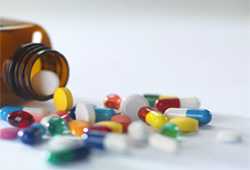 A recent analysis reveals that prescription drug prices continue to increase — even for drugs with FDA-approved therapeutic equivalents or biosimilar products. Dr. Nathan Wineinger evaluated the change in prescription drug prices over a 6-year period for the 49 top-selling brand-name medications in the United States. The price of 48 of 49 drugs increased at least once per year from January 2012 through December 2017, with the median cost increase at 76%, or 9.8% compounded annually. Of the 49 drugs, 16 more than doubled in price.
A recent analysis reveals that prescription drug prices continue to increase — even for drugs with FDA-approved therapeutic equivalents or biosimilar products. Dr. Nathan Wineinger evaluated the change in prescription drug prices over a 6-year period for the 49 top-selling brand-name medications in the United States. The price of 48 of 49 drugs increased at least once per year from January 2012 through December 2017, with the median cost increase at 76%, or 9.8% compounded annually. Of the 49 drugs, 16 more than doubled in price.
For 17 of the 49 drugs, either a therapeutically equivalent generic or a biosimilar drug was either being sold or soon-to-be-launched. The 6-year relative price increase of these 17 drugs (median, 79%) was not statistically different from the 6-year relative price increase of the other 32 drugs (median, 73%). The authors claim that this observation “suggests that prices of brand-name drugs are not largely affected by the presence of generic drugs or perhaps biosimilar products and others that may enter the market in the future.” Of the 17 medications, only Remicade® (infliximab) had FDA-approved biosimilar products commercially available during the collection of the study’s data set — Inflectra® (launched Nov 21, 2016) and Renflexis® (launched July 24, 2017). From 2012 through 2016, Remicade® had an average 9% annual growth in its median total cost but the growth slowed to 5% annual growth in 2017.
The biologic drugs in the analysis included Enbrel® (etanercept), Humira® (adalimumab), Orencia® (abatacept), Simponi® (golimumab), and several insulin products.
The authors remain uncertain if the observations “are not already a function of volume changes or speculation of upcoming volume changes as each drug approaches and surpasses the end of its federally protected exclusivity periods” even though the proportion of generic prescriptions filled has increased, signaling that patients and their providers may prefer generic or biosimilar alternatives.

